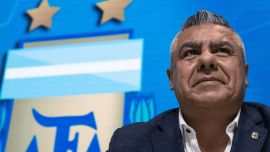As Argentina’s National Security Council met at La Casa Rosada on Tuesday to discuss the wave of unrest sweeping much of Latin America, government officials were hardening their rhetoric with a crunch election nearing.
A number of officials, including President Mauricio Macri's running-mate Miguel Ángel Pichetto, Foreign Minister Jorge Faurie and Security Minister Patricia Bullrich, have in recent days voiced strongly-worded opinions alleging that recent events across the continent are not random, but rather the symptom of a strategic alliance between Venezuela and Cuba that is seeks to "destabilise" the region.
South America has been the site of tremendous upheaval within the last month. Governments in Chile, Bolivia and Ecuador each face an angry, dissatisfied citizenry that has turned to violence in the streets in order to voice its opposition to economic inequality and alleged corruption. Peru has also experienced upheaval. In the case of Chile, it’s been called the worst violence the country has seen in decades.
Faurie described the surge in protests on Tuesday as “the work of coordinated action between coordinated groups” that is “clearly intended to generate extreme violence and destabilise the political process” across the entire continent.
These groups, Faurie said, are bolstered by the influence of Venezuela and Cuba. “They intend to intervene in the political, institutional and social lives of our countries, threatening us like a Bolivarian hurricane that brings in its winds hunger, poverty, dictatorship, the loss of liberty and a prison sentence,” Faurie commented.
“Bolivarian” refers to the philosophy of Venezuela’s founding father, Simón Bolívar, who believed in Pan-Americanism.
Argentina, itself in the throes of an economic crisis and facing an upcoming election on Sunday, has yet to experience a comparable insurgence of its own. But the peaceful demonstration turned violent protest at the Chilean consulate in downtown Buenos Aires Monday amplified concerns that such scenes could spread across the region.
Miguel Ángel Pichetto, senator and vice-presidential candidate on the Juntos por el Canbio ticket, cautioned voters that the stakes of Sunday’s election are even higher given this continent-wide movement of “organised processes that lead to destabilisation.”
“Facing this military dictatorship in Venezuela requires all candidates for president define their positions categorically,” he said.
Venezuelan Nicolas Maduro’s number two, Diosdad Cabello, was recently quoted as saying he was “happy with the wave of Bolivarianismo blowing through the region.”
Pichetto referenced these remarks made as evidence for the theory that the violence in Chile, Bolivia and Ecuador is somehow linked.
After having condemned the events that transpired Monday evening in Buenos Aires and partly blaming Chilean residents who reside in Argentina for the escalation, Bullrich said she believed the protests in Chile are about more than just a public transportation tax.
“[It] is an intentional effort to overthrow the government. There’s no explanation for this level of violence if it’s not to turn it over,” she said.
With less than one week until the election, government officials continue to call on the Argentine electorate to put their faith in the political process.
“In Argentina we are in the middle of a campaign and the spirit of the political forces is concentrated on the elections this Sunday,” Faurie said, saying this made the country especially vulnerable to the kind of destabilising forces he previously described. “Here, we have to stay aware, because we are defending freedom. Freedom doesn’t exist in Venezuela."
The government, citing the close ties to Caracas and Havana that developed under the administration led by former president Cristina Fernández de Kirchner, has repeatedly sought to push the line that a government led by Peronist presidential challenger Alberto Fernández would resemble that of Venezuela's.
– TIMES/PERFIL/NA



















Comments